| SHADOWS ON THE WALL | REVIEWS | NEWS | FESTIVAL | AWARDS | Q&A | ABOUT | TALKBACK | |||||
 Shadows off the beaten path Shadows off the beaten pathIndies, foreign, docs and shorts...
On this page:
LITTLE GIRL |
THE PAINTER AND THE THIEF |
TIME
| |||||
| See also: SHADOWS FILM FESTIVAL | Last update 9.Oct.20 | |||||
|
Little Girl Petite Fille Review by Rich Cline |  MUST
MUST  SEE SEE
| |||||
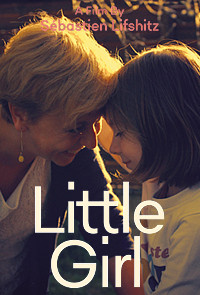 dir-scr Sebastien Lifshitz prd Muriel Meynard with Sasha Kovac, Karine Kovac, Anne Bargiacchi, Vassili Kovac, Valentin Kovac, Vadim Kovac, Lola Boubet release UK 25.Sep.20 20/France 1h25 BERLIN FILM FEST Now streaming... |
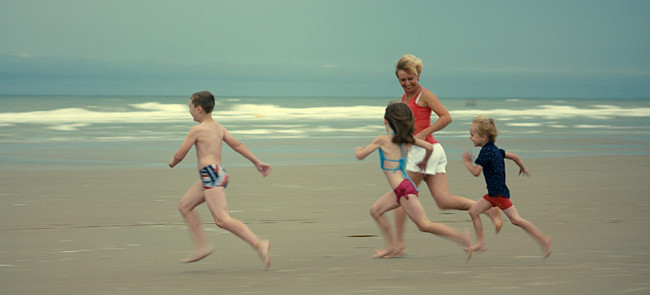 There's a disarming intimacy in this observant documentary, which plays out like a narrative feature. Gorgeously shot by Paul Guilhaume, the film is assembled by director Sebastien Lifshitz with an unusually open hand. At its heart, this is about a mother who simply wants her daughter to have a happy childhood, but must battle against a society stuck in misguided attitudes. And aside from being hugely important, it's a lovely story. Although born as a boy, Sasha knew at age 3 that she was a girl. Now 8, she's beginning to understand what this means. Apart from her friends at school, she is rejected by both boys and girls for being too feminine, following the lead of unsympathetic teachers. Armed with expert medical opinion, Sasha's mum Karine sets out to insist that teachers accept Sasha as she is, which shouldn't be so much to ask. But they arrogantly resist. And Karine knows that things are going to be even tougher for Sasha when she enters adolescence. There's a lyrical montage of home movies showing Sasha growing up from birth. Her mother feels that Sasha is missing her childhood because people refuse to accept her, so she takes Sasha into Paris to speak to the affirming psychiatrist Anne, who provides hope in the face of such awful treatment by Sasha's teachers and some classmates. The cameras are so close that we witness Sasha and her mum's feelings even as they try to control them, which is powerfully moving. We can vividly see why Karine is so determined to make her child's life better. With often astonishing access, Lifshitz uses fly-on-the-wall footage of Sasha playing with other kids, attending dance classes, simply being herself even when it's not very easy. Meanwhile, Sasha's parents describe their feelings in context of their three sons, all of whom have taken on board Sasha's gender as a girl. Karine has a powerful sense of responsibility mingled with guilt (because she wanted a girl). But she finds her voice to help Sasha be herself, with wonderfully straight-talking support from Anne. "This isn't an issue about tolerating something," Sasha's dad says. "Sasha is my kid, period." It's notable that Lifshitz never creates villains out of those who don't understand this simple fact. Tellingly, the children simply can't understand why adults have so much trouble with this. And Sasha's brothers and the family's au pair are also ready to fight her corner if needed. The ringing question is why any young child should have to face such cruel bigotry and violence.
| ||||
|
The Painter and the Thief Review by Rich Cline | 
| |||||
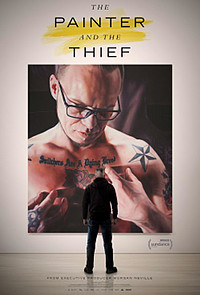 dir Benjamin Ree prd Ingvil Giske with Barbora Kysilkova, Karl-Bertil Nordland, Oystein Stene, Merete Morken Andersen, Linda Ville Ruud, Bjorn Inge Nordland, Janne Lind Nordland, Samara aka Sammy, Jan Berglund, Ann-Cathrine Gundersen release US 22.May.20, Nor 18.Sep.20, UK 30.Oct.20 20/Norway Neon 1h47 SUNDANCE FILM FEST  Now streaming...
| 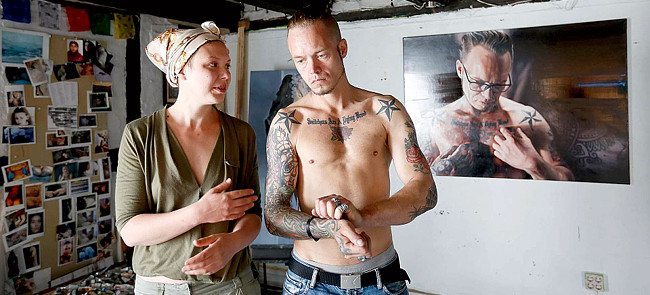 Playing out as a fascinating dramatic narrative, this documentary unfolds its story using found footage, surveillance cameras and remarkably intimate fly-on-the-wall sequences. Filmmaker Benjamin Ree is following the extraordinary story of an unexpected friendship, two people who shouldn't be able to see each other with such remarkable clarity. Perhaps they recognise that they're both survivors of difficult situations. And in many ways they're still struggling to get through. When two of her most important paintings are stolen from an Oslo gallery in broad daylight, Czech artist Barbora and her Norwegian boyfriend Oystein are told there is no chance of recovering them, even though the culprit was caught. At the trial, Barbora boldly approaches thief Karl-Bertil and asks if she can paint his portrait. And they start talking. Barbora is endlessly intrigued by him, incredulous that he can't remember what he did with her paintings because he was wasted at the time. As a friendship develops, Barbora keeps painting him, intrigued by his artistic soul and undiscovered potential. Karl-Bertil remembers finding her paintings beautiful, and he's overwhelmed when he sees his own portrait for the first time. The connection between these two is surprising and profound, with revealing moments like the first time Barbora visits his home, which is lined with original artwork. He describes his rough background and criminal antics, which sit at odds with his gentle demeanour and tender interaction with his girlfriend and parents. Meanwhile, Barbora is on her way to becoming a starving artist. Both Barbora and Karl-Bertil are compelling characters with big personalities. They way they describe each other is astonishing, as is their openness about revealing themselves. Barbora is driven by a restless curiosity, and has an ongoing interest in death. So of course Oystein struggles to understand her. Karl-Bertil is even more complex. Intensely thoughtful, he occasionally goes missing for days, stops to buy heroin on his way to rehab, then after a police altercation ends up in hospital and ultimately prison. And he remains likeable through all of this. "I really think you're the craziest person I've ever met," Barbora laughs. She finds inspiration in his dark side, but doesn't know much about his better days. Filmmaker Ree structures the story unusually, shifting perspective and cycling back and forth in time, filling in gaps in the narrative while continually digging deeper under the surface. Watching Karl-Bertil's transformation is powerful, as he creates a whole new life for himself. And their journey together takes several great turns.
| | |||
|
Time Review by Rich Cline |  MUST
MUST  SEE SEE
| |||||
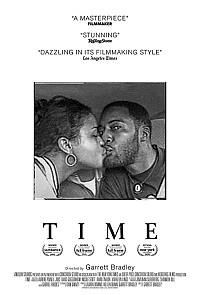 dir Garrett Bradley prd Lauren Domino, Kellen Quinn, Garrett Bradley with Sibil Fox Richardson, Robert Richardson, Mahlik Richardson, Remington B Richardson, Laurence Matthews Richardson, Freedom Fox Richardson, Justus Fox Richardson, Robert Fox Richardson II, Peggy V Autrey release US 9.Oct.20, UK Oct.20 lff 20/US Amazon 1h21 SUNDANCE FILM FEST  Now streaming... |
 Using a collage of black and white images, both new and from grainy home video, this artful, astute documentary explores America's thriving mass-incarceration industry, which disproportionately targets mainly poor people from ethnic communities. Filmmaker Garrett Bradley has a terrific eye for imagery and storytelling rhythms, drawing the audience deeply into the story. She packs so much into 81 minutes that this film feels like an urgent epic. In Louisiana, Sibil, aka Fox Rich, married her high school sweetheart Rob, and in pursuit of the American Dream, they opened a clothing store. Facing money problems, Rob held up a bank in desperation. He was sentenced to 60 years without parole (as the getaway driver, Fox served three and a half years). Over the following years, Fox documented her six son's lives without their dad, as they grew into sharp young men who have triumphed in their lives through education. And they know full well the obstacles they have faced along the way. In voiceover and on-screen, Fox and her sons ponder the impact of time without Rob. Fox recalls her mother Peggy's advice that trouble is easy to get into and hard to get out of. And it's easy to see her point that harsh prison sentences are a personal vendetta from a white-dominated culture still angry they lost the Civil War. "Our prison system is nothing more than slavery," Fox says. "And I see myself as an abolitionist." It's certainly true that mass-incarceration has gutted families and entire communities, making no one safer in the process. After fighting Rob's sentence for two decades, Fox is clearly exhausted, but she's also tenacious and radiant, refusing to let her pain drag her down as she speaks passionately on the subject. And her now-grown sons are by her side in a campaign they simply can't give up. In the process, they've become activists taking on the entire judicial system, which has been proven to be deeply flawed at every level, from policing to trials to imprisonment. The film is beautifully edited by Gabriel Rhodes to craft a powerfully involving personal story while also grappling with the much wider issue. Bradley largely uses footage that focusses intimately on faces, so the inventive structure delivers an engaging kaleidoscopic narrative that may be a bit light on detail, but it carries a razor-sharp message. It also puts the title into context, as we vividly see how this family has changed over 20 years. And the film's ending is a real stunner.
| ||||

See also: SHADOWS FILM FESTIVAL © 2020 by Rich Cline, Shadows
on the Wall
HOME | REVIEWS | NEWS | FESTIVAL | AWARDS
| Q&A | ABOUT | TALKBACK | | ||||


